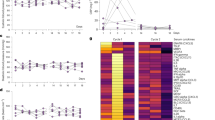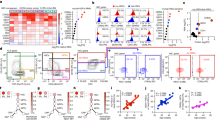Abstract
T-CELL-mediated lysis of virus-infected target cells in mice is restricted by the H–2D and H–2K antigens of the major histocompatibility complex (MHC) in the sense that the cytotoxic T cells are only active against virus-infected target cells sharing H–2D and/or H–2K antigens with the animal in which the killer cells have been raised1. These findings led to a better understanding of the way in which the MHC regulates certain functions of the immune system2, and they have been amply confirmed by further studies in inbred strains of mice and guinea pig which have indicated that restriction by antigens of the MHC is a general phenomenon in the T-cell-mediated immune response3 in these species. Evidence for MHC restriction of the immune response in man, however, was lacking until it was shown that a female patient who had rejected a bone marrow graft from her HLA-identical brother, had cytotoxic cells in her blood, and that the activity of these cells was restricted to male target cells which had the HLA-A2 antigen in common with herself4. We show here in a more general way, that the cell-mediated cytotoxicity which can be raised in humans against ‘altered self’ is restricted by the HLA-A, B and C antigens.
This is a preview of subscription content, access via your institution
Access options
Subscribe to this journal
Receive 51 print issues and online access
$199.00 per year
only $3.90 per issue
Buy this article
- Purchase on Springer Link
- Instant access to full article PDF
Prices may be subject to local taxes which are calculated during checkout
Similar content being viewed by others
References
Zinkernagel, R. M. & Doherty, P. R. Nature 248, 701–702 (1974).
Doherty, P. C. & Zinkernagel, R. M. Lancet i, 1406–1409 (1975).
Miller, J. A. F. P., Vadas, M. A., Whitelaw, A. & Gamble, J. Proc. natn. Acad. Sci, U.S.A. 73, 2486–2490 (1976).
Goulmy, E., Termijtelen, A., Bradley, B. A. & van Rood, J. J. Nature 266, 544–545 (1977).
Søeberg, B. & Anderson, V. Clin. exp. Immun. 25, 490–492 (1976).
Simpson, E. & Gordon, R. D. Immun. Rev. 35, 59–75 (1977).
Zinkernagel, R. M., Dunlop, M. B. C., Blanden, R. V., Doherty, P. C. & Shreffler, D. C. J. exp. Med. 144, 519–532 (1976).
Bubbers, J. E., Blank, K. J., Freedman, H. A. & Lilly, F. Scand. J. Immun. 6, 533–539 (1977).
Trinchieri, G., Bernoco, D., Curtoni, S. E., Miggiano, V. C. & Ceppellini, R. in Histocompatibility Testing 1972, 510–519 (Munksgaard, Copenhagen, 1973).
Simonsen, M. Transplant. Rev. 3, 22–35 (1970).
Author information
Authors and Affiliations
Rights and permissions
About this article
Cite this article
DICKMEISS, E., SOEBERG, B. & SVEJGAARD, A. Human cell-mediated cytotoxicity against modified target cells is restricted by HLA. Nature 270, 526–528 (1977). https://doi.org/10.1038/270526a0
Received:
Accepted:
Issue Date:
DOI: https://doi.org/10.1038/270526a0
This article is cited by
-
An HLA-A2 population variant with structural polymorphism in the ?3 region
Immunogenetics (1988)
-
Mutant HLA-A2 antigens as restricting elements for virus-specific cytotoxic T cells
Immunogenetics (1984)
-
The role of the human major histocompatibility complex in cytotoxic T-cell responses to virus-infected cells
Journal of Clinical Immunology (1982)
-
HLA restriction of human cytotoxic T cells
Springer Seminars in Immunopathology (1980)
Comments
By submitting a comment you agree to abide by our Terms and Community Guidelines. If you find something abusive or that does not comply with our terms or guidelines please flag it as inappropriate.



